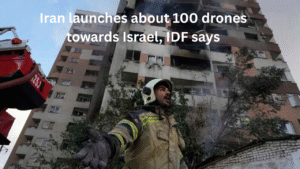Iran launches about 100 drones towards Israel, IDF says
israel’s military says Iran has fired
around 100 drones towards its territory
after Israel launched a major attack on
Iran overnight
let’s respond to some of the pictures we
have here. These are showing Israeli Air
Force jets to taking off before the attack
israel says it’s targeting the country’s
nuclear program
and this is the moment a blast hit the
capital Thran, Iranian media say
residential areas have been hit there
and across other cities too
Well, Iranian state media says the head
of the armed forces Muhammad Abageri and
the top commander of the Islamic
Revolutionary Guard Hussein Salami were
killed in the Israeli strikes two senior
nuclear scientists were also killed.
former head of Iran’s atomic energy
organization and the president of the
Islamic Azad University in Tehran.
follows days of speculation that Israel
was planning to launch military action
despite US efforts to negotiate a
nuclear deal with Tehran, Israeli Prime
Minister Benjamin Netanyahu says the
operation could last several days. We
targeted Iran’s main enrichment facility
In Natanz, we targeted Iran’s leading
nuclear scientists working on the
Iranian bomb, we also struck at the heart
of Iran’s ballistic missile program last
year Iran fired 300 ballistic missiles
In Israel, each of these missiles carries
a ton of explosives and threatens the
lives of hundreds of people. Soon those
missiles could carry a nuclear payload
threatening the lives not of hundreds
but of millions, Iran is gearing up to
produce 10,000s of those ballistic
missiles within three years
now just imagine imagine 10,000 tons of
TNT
landing on a country the size of New
Jersey this is an intolerable threat.
too must be stopped
Right, let’s get a sense of some of the
geography here in the early hours of the
morning, Israel announced it launched a
major military operation against Iran’s
nuclear program and senior military
Commanders of the israeli military targeted
dozens of sites in the country iranian
state media says parts of Tehran have
been hit, and the UN’s nuclear watchdog
the IAEA confirmed Iran’s main nuclear
enrichment site at Natans was also hit
in the Israeli strikes, well, Tran now
appears to have responded, Israel says
Iran launched around 100 drones at its
territory warning sirens have been heard
in major cities like Tel Aviv and
Jerusalem
speak now to Shashank Joshy, who’s
defense editor at the Economist, thanks
for coming on the program good morning
we’ll get into some of the details very
quickly, but just firstly, your headline
thoughts about what’s happened overnight
Well, first of all, this is perhaps
something of a surprise because it
preempts US-Iran nuclear talks that were
due for this weekend, so clearly Israel
preferring the element of surprise
rather than waiting for those talks to
conclude secondly the Americans very
very clearly stating that they were not
involved and and trying to stay out of
this, although they may well be dragged
into the aerial defense of Israel from
any retaliation, and I think the third
point is this is critical; this is very
early days we are probably only seeing
the first waves of what will be a
multi-day, uh, Israeli campaign, so for
instance I note with interest Israel has
not yet attacked Iran’s most deeply
buried nuclear site, which is in a place
called Foraux, uh, but I would be
surprised if that remains the case in
the coming hours and days so you
mentioned there that the timing took
many by surprise. What about the
reasoning behind striking like this now
the Israeli public claim is that Iran
was accelerating work towards a nuclear
Bomb them. In my opinion, while Iran has
conducted some weapons-related activity
Uh, since 2003, when it shut down, its
formal weapons program I don’t believe
that is the real trigger for this attack
i believe the real trigger is that
Israel sees a historic opportunity to
act politically, uh, at a period where US
Iran talks were looking relatively
unsuccessful in which Iran was looking
exceptionally weak, uh, in which its
principal ally in the region, Hezbollah
in Lebanon had been decimated by Israel
last year, uh, and in which Iran’s nuclear
program, um, it, particularly its stockpile
of enriched uranium was expanding
dramatically
and all of those factors together I
think made Israel decide this was the
time to take the great risk of attacking
those nuclear sites but also clearly
much more widely than just nuclear sites
Also, Iran’s military leadership and just
give us a an assessment of, uh, the words
overnight from Benjamin Netanyahu
describing, of course, the uh, the repeated
line that we know about, uh, the country
facing an existential uh threat from
Iran, what about your assessment of the
state of the nuclear program in Iran
Right now, well, Iran has had a nuclear
weapons program since the 1980s and in
The 1990s, uh, it authorized a decision to
build a number of nuclear bombs and
Test them, but in 2003 American
intelligence judges that they halted
that program, possibly because America
was of course at that time invading
countries on both sides of Iran Iraq and
Afghanistan, um, and so that program was
halted, and in fact as recently as March
the director of national intelligence in
America Tulsi Gabbard said that American
intelligence judged it was still halted
that Iran had not made a decision to
build a bomb, but that doesn’t mean that
Iran was not dabbling in elements needed
for a nuclear bomb if if we can
introduce that nuance. It was, for example,
looking at things like computer modeling
of how an nuclear implosion might work
it was looking at plastic explosives
for use in a nuclear device, uh, and so
for the Israelis, that was viewed to be
an unacceptable
progress towards a bomb, I think, in
general Iran has not moved significantly
closer to a bomb, in the last few
months it’s accumulated more uranium,
but that the key change took place in
2018, when Donald Trump pulled out of a
nuclear deal, the JCPOA, and at that
point onwards, Iran’s enrichment capacity
and its stockpile of uranium has grown
and that was the real shift after 2018.
would say, “Shashank Jonkey, thank you very much.”
much for your analysis that’s Shashank
Josh is defense editor at the
Economist, thank you
let’s speak now to our Middle East
correspondent Hugo Basha, who’s in
Jerusalem, Hugo, just talk us through what
we know what we don’t know right now
about what happened overnight
Yeah, Louis, so we know that the Israelis
carried out a large-scale attack on a
number of facilities in Iran
related to the country’s nuclear program
so we’re talking about military
facilities, nuclear sites, and also air
defense systems and, crucially, also
senior military leaders and also
scientists, so I think you know the
strategy here is very similar to the
Israeli strategy in Lebanon against
Hezbollah last year not only attacked
and destroy infrastructure but also to
attack the leadership to destroy you
know the chain of command so we’re still
getting reports about the identities of
those who have been killed, you know
state media in Iran has confirmed that
at least two senior military officers
have been killed have been assassinated
as a result of these attacks, now the
Israeli military said more than 200
planes were used in this operation.
more than 300 bombs were dropped at a
100 sites So, we’ve seen, you know, that
a number of locations across Iran at
least six cities were hit as a result
of those attacks that happened in
several waves uh during the morning
including the capital, Thran. we’re
still trying to understand the scale of
of the damage of the
destruction on the ground in Iran
state media is also saying that, you know,
a residential area of Tehran was hit.
you know it is reporting that civilians
were killed as well, but I think you know
the details and the statements coming
from the Israeli authorities suggest
that in their view this has been a very
successful operation to really damage
and destroy the capabilities the ability
of, Iran’s, of these facilities
being used by Iran in its nuclear
program. I think we’re also getting
indications from the Israeli authorities
that this could be just the beginning of
a prolonged offensive, so these
attacks are likely to continue in the
Next, in the next few days and even
weeks and Hugo what about people there
because you mentioned the time scale
They’re expected to continue. What does
That means for people living in Israel
Yeah, so there is a state of emergency
that’s been declared in, uh, Israel, and
the authorities have been warning the
population that they are expecting a
large response from, uh, Iran, uh, in terms
of drones and missiles being fired
earlier this morning, the military said
more than a 100 drones had been fired by
the uh Iranian military and that uh
reports now in the last few minutes
suggest that all drones had been
intercepted by the, uh, Israeli army.
think you know the concern here is that
Uh, this could be just the beginning of
this uh Iranian response that could
involve not only drones but also
missiles and attempt to try to overwhelm
the country’s air defense systems
Remember, this is a country that has a
very sophisticated system of protection
But again, what the authorities are
telling the population is that, uh, you
know they should expect a large response
from, uh, Iran following these attacks now
gatherings have been banned, uh, in Israel
Uh, schools are closed. Uh, the main
airport has also cancelled all its
flights, as the authorities are, you know
making preparations for this possible
Iranian response

